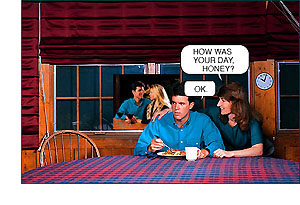Whenever people get together and operate as groups, they make agreements, whether actually stated or not, regarding what is right and what is wrong, what is moral and what is immoral-in other words, what will be contributive to survival and what will be destructive of survival. This is a moral code – a series of agreements to which a person has subscribed to guarantee the survival of the group. It doesn’t matter what the size of the group is – whether it is a group of two people forming a marriage or a whole nation being formed – they enter into certain agreements.
When one or the other of the partners in a relationship or a marriage transgresses against the agreed-upon moral code, he or she often feels that he cannot tell the other about it. But these transgressions, unspoken but nevertheless transgressions, can gradually mount up and cause a disintegration of the relationship.
In Scientology, a harmful act or a transgression against the mores of the group is called an overt act or overt. When a person does something that is contrary to the moral code he has agreed to, or when he omits to do something that he should have done per that moral code, he has committed an overt act. An overt act violates what was agreed upon.
An unspoken, unannounced transgression against a moral code by which the person is bound is called a withhold. A withhold is, then, an overt act that a person committed that he or she is not talking about. Any withhold comes after an overt act.
These transgressions are the degree that a person has separated himself from free communication with the remainder of the group. If, for example, a man gambles away the money needed to pay the family bills, he has committed an overt act. And if he then hides this fact and never mentions it to his wife or family, he would be pretending to be part of the group while no longer being part of it, as he has broken the agreements that the group is based on. It is this factor which causes the disintegration of a group or a family or a marriage.

This action is a violation of the agreements of the marriage and is classified as an overt act.

The man is reluctant to communicate to his wife what he did. This is an example of a withold.
A marriage which has broken down into a super-separateness of overt acts and withholds is almost impossible to put back together by just postulating it into existence. After people have separated themselves out from each other, they have to “un-separate” themselves again.
Some who get married may think the way this is supposed to go is: on some bright June day this handsome brute (or not so handsome), and this beautiful girl (or not so beautiful), come together, and they say, “I do, till death do us part . . .” And they think they have now made a marriage. They haven’t even started yet.
They have to find out how they look before breakfast. This arrangement has more to do with cosmetics and razor blades than anything else. They have to learn to live with each other if they can. And to some degree, they have wiped out, more or less by the act of getting married, what they were doing before that and they start from there.
What happens from there on out is what counts. But sometimes things they have done before, which they are violently withholding from each other, don’t even let the marriage get started and forty-eight hours later their marriage is on the rocks because there is just too much overt and withhold before they even knew each other.
But even that one can be salvaged.
In a marriage which has ground on for years and years, overt acts and withholds can mount up until the partners “grow apart.” It’s considered to be traditional that at the end of three years, husbands and wives don’t get any “kick” out of each other. This is sort of textbook and “all the psychologists know it,” but they don’t know why. It’s the overt acts and withholds.
If at the end of three years this is the case, how about at the end of ten? By that time, many couples have just learned to endure. They are both in propitiation – a state of trying to appease each other or reduce the anger of each other. They are getting along somehow and they would rather have it that way than some other way; they would rather be married than not and they think they’re making it okay. They don’t think too much about the girl or the guy they should have married instead anymore. It’s going along somehow.
Now into that relationship we can introduce one of the most startling assaults: we can clear up the marriage!
All a divorce is, or all an inclination or withdrawal is, is simply too many overts and withholds against the marital partner. It’s as uncomplicated as that.
When a marital partner is straining and wanting to leave and saying “I ought to go” or “I ought not to stay” or “I ought to do something else” or “We ought to split up” or “I’d be much better off if we hadn’t,” all of those rationales stem immediately from the overt acts and withholds of the partner making those rationales against the other partner.
Actually, the basic reason a person does this is that he’s trying to protect the other partner from his own viciousness. So he says, “Well, I’d better leave,” “We’d better break it up” or “We should cool it off.” And that’s usually the gradual approach of a marriage breakup – “Cool it off,” “I ought to leave,” “We should part.” But we can take these things now and “uncool” them off.
Probably while you’re trying to clean up a marriage between a couple, they will undoubtedly decide that it’s all over and there’s no reason to go on with it because one couldn’t possibly . . . The thing that saves the day each time is to get each to remember what he himself or she herself did. If they just keep that thought firmly in mind, it will come through to a perfect completion.